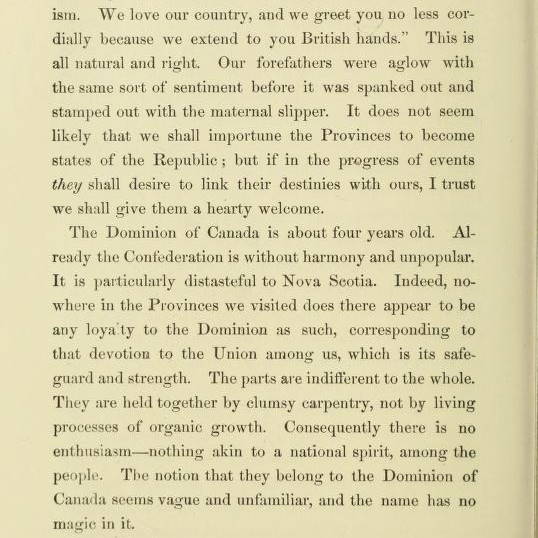“This letter will give you some gleanings from Halifax — the most English of the provincial cities. It was founded in 1749, by the Lords of the Board of Trade, and named after the President, Gen. Montague, Earl of Halifax. It has ever since been the capital of Nova Scotia, — robbing that honor from Annapolis. Thirteen transports brought from England 2576 emigrants, the nucleus of the present population, which counts about 40,000 souls. The sloop of war Sphinx led the way, bearing Colonel the Honorable Edward Cornwallis as Captain General and Governor of Nova Scotia. He afterwards presented a sword to Gen. Washington at Yorktown, a circumstance which will never be forgotten. His name is more pleasantly linked with Cornwallis County, the garden of the province.
Immediately upon landing, the town was laid out in squares, with streets sixty feet wide. A fence of upright pickets or palisades enclosed the town, running up from two points in the harbor, with block houses at frequent intervals. The town of Dartmouth, on the opposite side of the harbor, began its career a year later, in 1750, and in the year following some German settlers added themselves to the colony occupying the North End, now called Dutch Town, through which we came from the depot. So late as 1780 the streets were impassable for carriages by reason of rocks and stumps. They have not yet attained the dignity and cleanliness which paving stones impart.
We linger long in the cool, breezy atmosphere of our lofty station. North is Bedford Basin, covering ten square miles and able to hold the whole British Navy. Indeed, I doubt not that in the North East arm which is nine miles long and includes the Basin, the navies of the world might assemble in grand convention and be secure as sheep in a fold. West, across the harbor, one mile, the town of Dartmouth is tilted up so as to display all her charms, most conspicuous and central among which is the Lunatic Asylum, an imposing structure of freestone.”
“The question coming oftenest to the surface of every-day speech in the Provinces, which the stranger hears discussed everywhere, is annexation. It is not easy however, to discover what the people themselves want. One will tell you the majority are for, another that it is overwhelmingly against the project. The truth seems to be that political thought in the Dominion is in a transition state, waiting for “something to turn up.” If England would disclose her intentions respecting the Provinces, the proposition would be simplified. At present, I am told opposition to annexation is not based on any conviction regarding material thrift, but is a matter of pure sentiment.
Mr, Wetmore (himself an annexationist, I believe) finely expressed the feeling which, no doubt, pervades many provincial breasts, when he said in the saloon of the steamer New Brunswick: “It is not necessary for the sake of paltry rhetoric to throw away one bit of our patriotism. We love our country, and we greet you no less cordially because we extend to you British hands.” This is all natural and right. Our forefathers were aglow with the same sort of sentiment before it was spanked out and stamped out with the maternal slipper. It does not seem likely that we shall importune the Provinces to become states of the Republic; but if in the progress of events they shall desire to link their destinies with ours, I trust we shall give them a hearty welcome.
The Dominion of Canada is about four years old. Already the Confederation is without harmony and unpopular. It is particularly distasteful to Nova Scotia. Indeed, nowhere in the Provinces we visited does there appear to be any loyalty to the Dominion as such, corresponding to that devotion to the Union among us, which is its safeguard and strength. The parts are indifferent to the whole. They are held together by clumsy carpentry, not by living processes of organic growth. Consequently there is no enthusiasm — nothing akin to a national spirit, among the people. The notion that they belong to the Dominion of Canada seems vague and unfamiliar, and the name has no magic in it.
In the Provinces farther north and west, there is a furor for independence, finding some sympathy throughout the Dominion. Men are dazzled with visions of a grand empire bounded by three oceans, and wait impatiently the snapping of the leading strings which have become “attenuated to cobwebs.” It is likely that the child will soon go alone; and not unlikely, I think, that in some crisis of croup or teething it may be turned over to the United States as to a sort of Children’s Home.”

Davis, A. H; Sawyer, Caroline M. (Caroline Mehetabel), 1812-1894. “Coit correspondence of 1871, or, The second trip to New Brunswick by the Coit family”. 1872. Worcester [Mass.] : Printed by Chas. Hamilton, Palladium Office https://archive.org/details/coitcorresponden00davi
